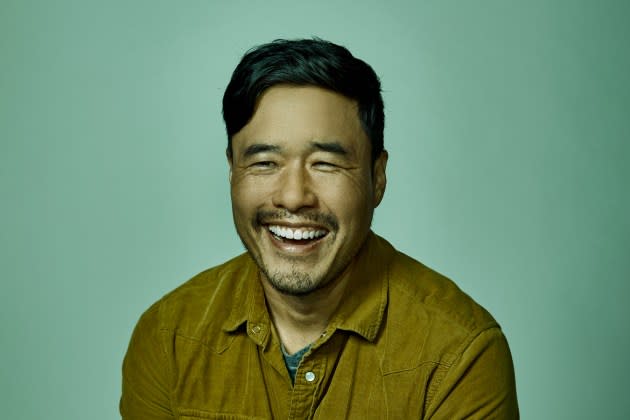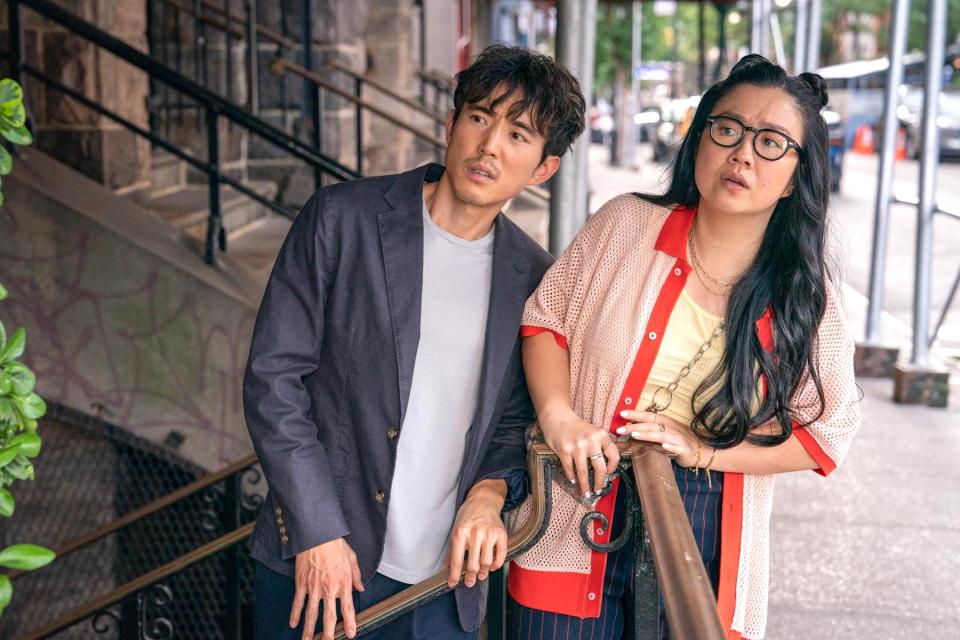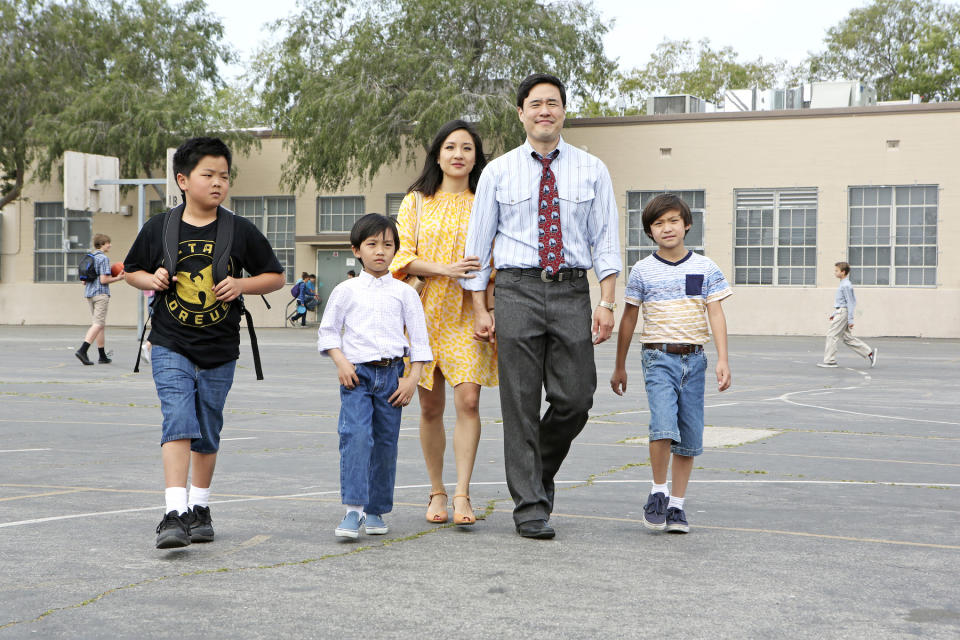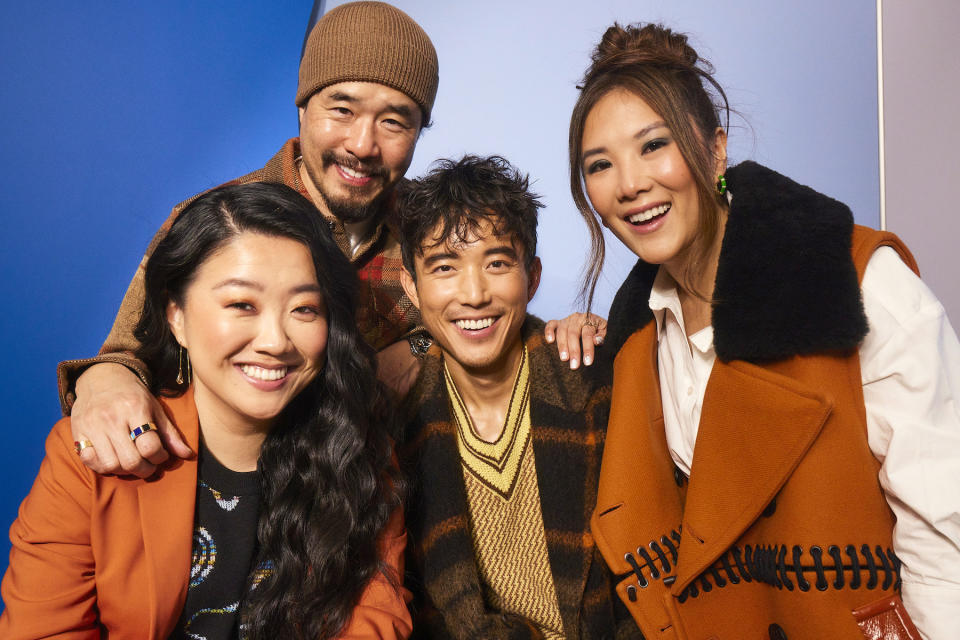Randall Park Fought Like Hell to Get Here
- Oops!Something went wrong.Please try again later.
- Oops!Something went wrong.Please try again later.

Randall Park is seemingly everywhere nowadays. He’s FBI Agent Jimmy Woo in the Marvel Cinematic Universe, popping up in this year’s Ant-Man and The Wasp: Quantumania and the upcoming The Marvels. Over in the DC Extended Universe, you can see his Dr. Stephen Shin, who’ll feature in the Christmas release Aquaman and the Lost Kingdom. And behind the camera, his feature directorial debut, Shortcomings, is now playing in theaters.
Serving as counterprogramming to twin blockbusters Barbie and Oppenheimer, Park’s film tells the story of Ben (After Yang’s Justin H. Min), a contrarian Asian American slacker who manages an arthouse cinema in Berkeley, California. A fount of pretension, his holier-than-thou attitude pushes away his long-time girlfriend Miko (Ally Maki) and a white co-worker he has his eye on (Tavi Gevinson). His only co-conspirator is Alice (Joy Ride’s Sherry Cola), whose patience with her grumbling pal is running thin. Stephanie Hsu, Ronny Chieng, Sonoya Mizuno, and Timothy Simons join in on the fun as well. Will Ben ever deal with the internalized racism and self-hatred that’s turned him into an asshole before it’s too late?
More from Rolling Stone
Emmy Awards Pushed to January 2024 as Hollywood Strikes Continue
SAG Actors Want Higher Residuals. Here's How Streaming Residuals Work
Adapted from a comic by Adrian Tomine and premiering to raves at Sundance, Shortcomings is an impressive first feature for Park, who previously co-wrote, produced, and starred in the romcom Always Be My Maybe alongside one of his oldest pals, Ali Wong. And it’s taken the 49-year-old Park two decades navigating Hollywood, a town that’s been unkind (to say the least) to Asian Americans, to get to this pivotal point of his career — a journey that’s included “diversity showcases,” stereotypical bit parts, memorable turns on comedy series like The Office and Veep, or films Neighbors and The Interview, and a leading role on the groundbreaking sitcom Fresh Off the Boat.
Park spoke with Rolling Stone about his long road to Shortcomings and Asian representation onscreen.
How difficult was it to get a film like Shortcomings made in this climate?
Once I came onboard, Adrian Tomine and I developed the script for a couple years, and that’s when we brought it out to seek financing or distribution. We took it pretty much everywhere and got rejections everywhere. Eventually, we landed with a company called Topic, which saw what we were going for and decided to put in some of the financing, and then a company called Tango came in shortly afterward and we had full financing. But before Topic and Tango, it was very difficult. It was a tough sell.
Ben is the type of slacker-prick you normally don’t see an Asian guy playing in — let alone anchoring — a film. He’s not as likable as John Cusack in High Fidelity, but there’s a similar brand of pretentiousness. What made you want to bring this guy to the screen?
One of the things that attracted me to the original source material to begin with was that it was a glimpse at a kind of person I was familiar with. I knew people like this, and there were parts of me that identify with people like this. It felt so real to me in that way, and it was a story that was not being told — and had never been told — in feature films, as far as I was aware of. The thought of bringing a character like this to life onscreen was very exciting because I think good representation means every kind of representation, and this was a character we hadn’t explored yet as a culture.
You get the sense that Ben has internalized a lot of racism and it’s turned him very negative about everything, and he’s become a miserable person because of it.
Yeah. And he’s not conscious of the ways in which he’s internalized it. He’s just living his life. Again, I think it goes back to something that’s really real to me. I think a lot of us are not conscious of the ways we’re shaped by the outside world, but they find their ways to express themselves within us. It’s not just the racism he’s encountered throughout his life, but all the experiences that make him who he is. His experience in high school is mentioned in the film, and although we don’t go super into it, you understand he had a really rough time in high school. He describes it as a “Mormon modeling agency,” and that little piece of information is very telling.
You also suspect it’s why he’s put white women on a pedestal and fetishized them, to a degree. He has a moment toward the end of the film where he’s put on the spot and tries to explain it away a bit, saying something to the effect of, “When I see an Asian guy with a white woman, I think he’s the man,” but he has issues with Asian women dating white men. And you don’t see many examples of Asian men depicted as desirable in the culture, so it’s given him this complex.
These are definitely conversations I’ve heard before, outside of this movie, and it speaks to the complexity of a community and the ways people internalize and process race.

I remember when Crazy Rich Asians came out and it was seen as “groundbreaking” that it has two brief scenes where Asian guys pop their shirts off and look sexy. And they’re not even fucking or anything. Just two short scenes of hot Asian dudes shirtless showing abs.
I feel like in American pop culture right now there’s this idea of the “sexy Asian male” as something new. It’s somehow this new phenomenon, but sexy Asian men have been around for as long as Asian men have been around.
We’ve had Keanu Reeves for a while.
Oh yeah, come on. The sexiest! He’s beautiful.
That’s what happens when you’re unproblematic.
That’s right! [Laughs]
Shortcomings is bookended with a parody of Crazy Rich Asians. What impact did you see that having for representation in the industry? And of course, we recently had Everything Everywhere All at Once cleaning up at the Oscars.
For me, I was very conscious and in support of the importance of [Crazy Rich Asians]. It felt like the beginning of something, you know? Of a shift in culture for Asian Americans, and I think it really spoke to the massive success of that movie. It wasn’t just Asians watching that movie — it was so many different people. From my perspective, in this industry, we had been told time and again that our stories wouldn’t connect with Middle America. They won’t understand it and won’t be able to identify with our stories. It proved that these stories are universal, ultimately, and for everybody.
Asians folks have some of the worst representation in Hollywood by the numbers, and it’s never made sense to me because studios are courting the Asian box office, which is almost as big as the North American box office. But it feels like Asians aren’t really allowed to complain about that because of the whole “model minority” thing.
Totally. I feel like, just in general, this industry is taking the wrong lessons. For example, Barbie is this massive blockbuster, and the idea is: Make more movies about toys! No. Make more movies by and about women!
Right. The lesson here should be that you gave this brilliant independent woman filmmaker in Greta Gerwig the reins to a big blockbuster movie and had Margot Robbie star in and produce it.
Exactly! Think like that. It’s Greta Gerwig!

What’s it been like for you managing the boxes that Hollywood puts people in — particularly Asian actors? You really powered through and came out on the other side of it, but it took many years of grinding.
Really, that’s what it was for me. I almost didn’t think too much — or dwell too much — on the challenges, because for me, dwelling on things that I can’t control was just an exercise in not progressing. I took each job at a time, did the best I could with what I got, and kept moving forward without dwelling on how racist the industry is, or the problems reflective of the greater society that I couldn’t do much about. I was chipping away at making a difference.
Did it ever become demoralizing and did you ever want to hang it up when you were reading for, like, your eighth doctor audition in a row thinking, “I’m clearly capable of so much more, and this is how you see me.”
[Laughs] For sure. Definitely. There were times when I did try to quit. There was a period where I decided, “I’m going to quit. I’ve always wanted to become an architect. I need to take some prerequisites at the community college, and I’ll go into architecture.” I enrolled in Santa Monica College, took a basic physics class, could not pass the class — because I was so out of practice — and ended right back auditioning again. Fate always brought me back to acting.
You couldn’t pass that basic physics class and now your movie is going up against Oppenheimer.
[Laughs] That’s right!
I read that it took you a long time to secure an agent in Hollywood, and that you had to participate in “diversity showcases” for the networks to get cast. What was it like to audition at a diversity showcase? It must be a surreal experience to look back on.
I don’t think they have those anymore in the same way, and a lot of these executives in these diversity departments have been either leaving their jobs or the jobs are getting cut. Those diversity showcases originally came out of a period when a lot of community-based organizations were publicly going in on these networks and studios and giving them report cards on the numbers of who was being represented in their programming. In response to this criticism, they formed these departments that were dedicated to finding and nurturing talent, and a lot of them created these live showcases where they’d get a theater in L.A., a bunch of talent, and would essentially put on these short sketches and shows for an audience full of executives, agents, and casting directors. I ended up doing quite a few of those for different networks, and those were pretty helpful for me early on.

It just shows you where the industry was at the time that they had to basically round up actors of color in a playhouse and give them their own separate talent competition.
It is surreal. During my come up, that was something that gave me another shot at it, and I needed to get as many shots at it as I could. I was hungry for any kind of opportunity.
Your movie was a hit at Sundance and now it’s being released in the summer and going up against Barbenheimer. What’s it like to be the counterprogramming to these behemoths?
Hey, man: I see it as Barbenheimercomings. The three of us together have broken records! [Laughs] Ah, no. I can’t control any of that stuff, so it doesn’t affect me too much. I am genuinely happy that we got acquired by a great company like Sony Pictures Classics and are out into the world. It’s such a challenging time for our movie on numerous levels, but I do feel confident that we’ll find our audience eventually. When we got into Sundance, I said, “Whatever happens from here on out is extra.”
One of those challenges is the movie being released during the ongoing Hollywood strikes. The strikes have been called an inflection point in the industry, and involves topics like streaming residuals, AI, wage increases, healthcare, etc. How do you feel about this fight?
I feel like it has to happen now. I don’t think we can wait any longer till certain things get out of control. You can say it’s already out of control. I think it’s a good thing, and even though it affects our movie in some ways, I feel like if given the choice to push the strike later, I would think not because it’s very urgent. The issues are very important, and we need to try to figure out the answers as soon as possible and come to an agreement as soon as possible. I do feel like the time is now.
I’ve talked with Seth Rogen about the insanity surrounding The Interview, and looking back on it now, what was it like to be caught in the middle of an insane geopolitical controversy like that? Were you being interviewed by government officials and stuff?
It was, gosh… surreal. It was just surreal. It felt like it happened so quickly. I had such a great time in production making the movie, and when all that happened, I couldn’t believe it. It didn’t feel like it was actually happening. It felt like a very weird dream.
Did you receive any threats over it?
No. That was a big misconception. A lot of people thought I did, but I didn’t.
I rewatched the music video to Eminem’s “Phenomenal,” and it’s insane. It’s Eminem kicking the shit out of all these Asian dudes, and then there’s John Malkovich as a crime lord eating noodles, and then you get carjacked by Eminem. What was that experience like?
It’s bonkers. Again, super surreal and super random. I got a call saying, “Eminem wants you to be in his video.” As soon as I heard “Eminem” I was like, “Absolutely, I’m a big fan.” I got on set and it was a huge production. And I was just hangin’ with Eminem! He was so nice. Super cool. We talked about so many things. I told him how big of a fan I was, and he’s a really big comedy fan. We vibed, it was great fun, and I came away from that thinking, “That was amazing and so weird!” I still can’t believe I was in an Eminem video.
You’ve been starting theater companies for years to help Asian American actors. Could you tell me a bit about Lapu, the Coyote that Cares, the Asian American theater company you started at UCLA? How formative of an experience was that for you?
During my undergraduate at UCLA I was an English major with a specialization in creative writing. I wrote a lot of short stories, eventually got into playwriting, and a couple of playwright friends and me were like, “Let’s form a theater group and perform these plays.” I had written this full-length play and we built the show around this play. It was an Asian American theater company, we built out the cast, and that was the first company. Over the years in college, we kept writing stuff, performing stuff, directing, costume direction, marketing. We did everything surrounding our shows, and it was such a great initial place to learn, make mistakes, and get better. From that, once we graduated, we formed another group [Propergander] and put on more shows. My first experience acting, directing anything, and seeing stuff that I wrote get performed was at UCLA. That whole experience was very formative. Writing comedies, seeing audiences laugh, and seeing what works and what doesn’t — I can see the through line from that to directing Shortcomings.
What was that first play you put on?
It was called Treehouse Bachelor’s Society — an absurdist comedy with musical elements. Because I’d never wrote a full-length play before, I threw everything into that play. It’s a bit of a mess, but I learned a lot.
You met Ali Wong at UCLA, right?
She was a member of that theater company, but I had graduated by the time she came in. I believe I met her at the party of a friend I was connected to through the theater company, and we’ve been friends ever since. And we’re not the only ones to come out of that theater company. So many working actors; executives in the industry; writers like Michael Golamco, who co-wrote Always Be My Maybe; performance artists like Kristina Wong. A lot of folks came out of that theater company. It’s crazy and it’s wonderful that we’ve known each other for so long. I always wanted to come up with a class of people. You read about Judd Apatow, Ben Stiller, Adam Sandler, and that whole camp, and it was always like, gosh, that would have been so cool to have. But I now look back and realize, “Oh, I have those relationships! And a lot of us are thriving in the industry.” It’s pretty remarkable, especially for an Asian American college theater company.
Best of Rolling Stone

